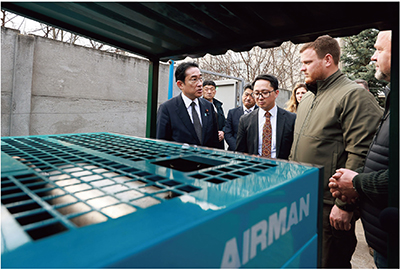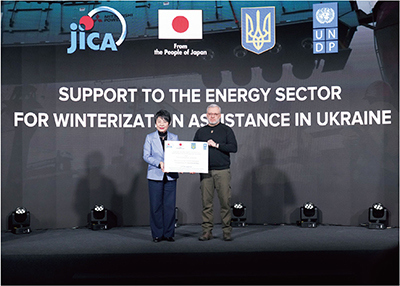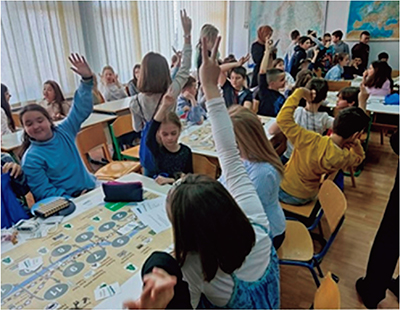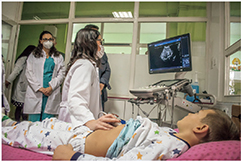5 Europe
Russia’s aggression against Ukraine has deteriorated the humanitarian situation in Ukraine and its neighboring countries and destabilized Ukraine’s economy and society. The situation has also disrupted global supply chains across the world, bringing into sharp relief new challenges for the entire international community, regarding food and energy security, which form the basis for people to live with dignity, as well as the maintenance and strengthening of a free and open trading system. Such compound crises are by no means “someone else’s problem” for Japan, and have seriously affected both the life of Japanese citizens and the business of Japanese companies.
Taking the consistent position that Russia’s outrageous act should not be tolerated and that it is necessary to advance support for Ukraine and its neighboring countries, Japan has been working with the international community, including G7 members, since the outset of Russia’s aggression against Ukraine. Regarding the recovery and reconstruction of Ukraine, Japan also works to further promote joint support by the public and private sectors, including through the organization of the Japan-Ukraine Conference for Promotion of Economic Growth and Reconstruction held in February 2024.
Many countries in Central and Eastern Europe and of the former Soviet Union that were once under communist regimes currently pursue market-based economic development. Japan regards European countries as important partners that share fundamental values such as human rights, democracy, market economies, and the rule of law, and supports their efforts, such as reconstructing economic infrastructure and addressing environmental issues. In addition, Japan seeks to strengthen comprehensive relations with the European Union (EU) and other Europe-based international organizations through the continuation and promotion of dialogues and collaborations and through the development of human networks.
● Japan’s Efforts
■ Support for Ukraine and Its Neighboring Countries
(Overview)

Prime Minister Kishida inspecting the generators provided by Japan as winterization assistance (March 22, 2023) (Photo: Cabinet Public Relations Office)

Foreign Minister Kamikawa, during her visit to Ukraine, attending the ceremony for the provision of large-scale power-related equipment to Ukraine on January 7, 2024
In March 2023, Prime Minister Kishida visited Ukraine to directly observe the situation including damage caused by Russia’s aggression against Ukraine. He also held a summit meeting with Ukrainian President Zelenskyy and conveyed Japan’s unwavering support for and solidarity with the people of Ukraine, as a representative of Japan and the G7, which Japan held the Presidency of. Prime Minister Kishida stated that, in addition to the humanitarian and financial assistance totaling approximately 1.6 billion US dollars that had been committed since 2022, Japan decided to offer additional financial assistance of approximately 5.5 billion US dollars and new bilateral grant aid amounting to 470 million US dollars to demonstrate solidarity with Ukraine once again on the occasion of the one-year mark of Russia’s aggression. He also stated that Japan would steadily implement the assistance to support Ukraine in various fields, including mine action, debris clearance, and livelihood reconstruction including electricity.
At the G7 Hiroshima Summit held under Japan’s Presidency in May, the situation in Ukraine was discussed in Session 2 where Prime Minister Kishida stated that public-private efforts would be essential for the medium- to long-term recovery and reconstruction of Ukraine. Furthermore, in Session 8 “Ukraine,” President Zelenskyy was invited as a guest and further discussion took place on Ukraine (see Part I, Section 2 for details on the G7 Hiroshima Summit).
In June, then Foreign Minister Hayashi attended the Ukraine Recovery Conference, co-hosted by the governments of the United Kingdom and Ukraine in London, and expressed Japan’s intention to vigorously implement reconstruction assistance. He announced that Japan will offer 5 million US dollars in emergency humanitarian assistance for food, water and sanitation (WASH), health, etc. to those affected by the flood disasters caused by the dam collapse at the Kakhovka Hydroelectric Power Plant, and will provide equipment including large water tanks and water purifiers through JICA as well as emergency humanitarian assistance through NGOs.
On September 6, Prime Minister Kishida delivered a video message at the “Three Seas Summit” held in Bucharest, the capital of Romania, and expressed Japan’s support for the Three Seas Initiative (3SI) that would contribute to a strong, prosperous and united Europe by bolstering the connectivity of Central and Eastern Europe and the Baltic States.
On September 9, then Foreign Minister Hayashi visited Ukraine. Representatives of Japanese private companies accompanied him, exchanged views with Ukrainian dignitaries, and confirmed cooperation between Japan and Ukraine for Ukraine’s recovery and reconstruction. Prior to his visit to Ukraine, then Foreign Minister Hayashi visited Poland to meet with Foreign Minister Rau for the third time in 2023 and concurred that Japan will work together with Poland, where many private companies are involved in the reconstruction effort, to facilitate public-private collaboration in the reconstruction of Ukraine with its geographical and historical background.
Japan reopened the JICA Ukraine Office on November 1 in order to provide swift and steady support across a wide range of fields when implementing its full-fledged support in the upcoming recovery and reconstruction phase.
On November 20, State Minister for Foreign Affairs Tsuji and State Minister of Economy, Trade and Industry Iwata visited Ukraine as an economic mission, joined by Japanese business representatives who have a high interest in Ukraine’s recovery and reconstruction. The two state ministers, along with the accompanying Japanese business representatives, paid courtesy calls on the dignitaries of the Government of Ukraine, including Prime Minister Shmyhal, and exchanged views with representatives of the Ministry of Economy of Ukraine, the Ukrainian Chamber of Commerce and Industry, and the Federation of Employers of Ukraine. During the visit, Japanese business representatives were paired with Ukrainian counterparts to actively exchange their opinions on cooperation between companies from both countries in the reconstruction of Ukraine.
On December 6, at the G7 Leaders’ Video Conference, in which Ukrainian President Zelenskyy also participated, Prime Minister Kishida announced that Japan had decided to provide an additional assistance of approximately 1 billion US dollars, including humanitarian, recovery and reconstruction assistance. The G7 leaders shared the view that they will continue to strongly promote support for Ukraine.
On January 7, 2024, Foreign Minister Kamikawa visited Ukraine and paid a courtesy call on President Zelenskyy and Prime Minister Shmyhal. She also held a meeting with Foreign Minister Kuleba and directly conveyed that Japan’s position of standing with Ukraine is unwavering.
On February 19, 2024, the Japan-Ukraine Conference for Promotion of Economic Growth and Reconstruction took place in Tokyo, attended by government officials and business representatives from both Japan and Ukraine. The two sides confirmed their intention to work closely together and to further vigorously support recovery and reconstruction efforts through public-private collaboration.
Japan will continue to strive to strongly support Ukraine, including in the field of recovery and reconstruction.
(Humanitarian Assistance)
Since the start of Russia’s aggression against Ukraine, Japan has provided Ukraine and its neighboring countries with support totaling 7.6 billion US dollars in the fields of humanitarian, finance, food, and recovery and reconstruction assistance. In addition, in December 2023, Japan decided to offer an additional assistance of approximately 1 billion US dollars.
In February 2023, Japan extended Emergency Grant Aid of approximately 550,000 US dollars through the United Nations Office for Project Services (UNOPS) to deliver reflective materials and heat packs to the National Police of Ukraine (NPU) as winterization assistance, part of the humanitarian assistance. In addition, as part of the efforts to exemplify the commitment made by Prime Minister Kishida during his visit to Ukraine in March, Japan contributed 70 million US dollars to the United Nations Development Programme (UNDP) with the aim of recovering and enhancing power supply to Combined Heat and Power Plants (CHPs), which provide Ukrainian people with electricity, heat, and water. In response to the flood disaster caused by the collapse of the dam at the Kakhovka Hydroelectric Power Plant in southern Ukraine on June 6, Japan decided on June 20 to offer Emergency Grant Aid totaling 5 million US dollars in such areas as food, water and sanitation (WASH), and health through the World Food Programme (WFP), the United Nations Children’s Fund (UNICEF), the International Organization for Migration (IOM), and the United Nations High Commissioner for Refugees (UNHCR). Furthermore, on June 23, Japan announced that it would provide approximately 160 water purifiers, about 30 drain pumps, 4,000 plastic water containers, and 21 water tanks through JICA, as well as transport 8,000 meters of safety rope and 3,000 pieces of adsorbent materials, which the Ministry of Land, Infrastructure, Transport and Tourism of Japan has decided to provide. In September, before Ukraine entered its second severe winter season since the beginning of Russia’s aggression, Japan provided two autotransformers to the Government of Ukraine through UNDP. Furthermore, when Foreign Minister Kamikawa visited Ukraine in January 2024, Japan supported the transportation of seven autotransformers through UNDP and provided five gas turbine generators through JICA and UNDP, which were expected to benefit more than 5 million people. Japan intends to contribute to the recovery and reinforcement of electricity and heating supplies through support to the damaged energy infrastructure facilities, helping the people of Ukraine to overcome the winter.
(Recovery and Reconstruction Assistance)
With a view to the future stability of Ukraine, Japan has supported from an early stage the country’s recovery and reconstruction in areas such as mine action and debris clearance, which are prerequisites for recovery and reconstruction, the restoration of basic services, including infrastructure for electricity, the recovery of agricultural production and the rehabilitation of industry, and the strengthening of democracy and governance. Based on this policy, in March 2023, Japan decided to provide grant aid totalling 75.51 billion yen for “the Programme for Emergency Recovery” and “the Programme for Emergency Recovery Phase 2.”
In February, a ceremony was held in the capital Kyiv to hand over broadcasting equipment to the Public Broadcasting Company of Ukraine (PBC), as part of support for strengthening democracy in Ukraine. In March, another handover ceremony was held in Kyiv to provide sunflower and corn seeds to the Government of Ukraine through JICA, as part of efforts to recover the production capacity of agriculture, which is Ukraine’s key industry. This support was intended to contribute to the economic stabilization of the country, which is one of the main food suppliers in the world, and ultimately to improve the global food supply. Also, in September, a ceremony was held in the presence of then Foreign Minister Hayashi, who was visiting Ukraine, to hand over 24 crane trucks, which are necessary for UXO/mine action, to the State Emergency Service of Ukraine (SESU). Moreover, in November, another ceremony was held in the presence of State Minister for Foreign Affairs Tsuji and State Minister of Economy, Trade and Industry Iwata, who were both visiting Ukraine, to hand over 50 Japanese-manufactured Advanced Landmine Imaging Systems (ALIS) and 40 vehicles to SESU.
Going forward, Japan will provide joint support between the public and private sectors, taking into account the progress made at the Ukraine Reconstruction Conference in February 2024.
(Financial Support)
To mitigate the economic impact of Russian aggression, Japan provides Ukraine with assistance to address its urgent short-term financial needs. In 2023, Japan announced a total of 5.5 billion US dollars in budget support, which was enabled by amending the law to provide credit enhancements for the World Bank loans for Ukraine. Also, Japan has compiled the G7’s consensus to pave the way for the IMF program as the G7 Presidency and also adjusted interest payment schedules for the World Bank loans in order to help Ukraine’s liquidity situation for a certain period of time.
(Support for Poland and Moldova)
Russia’s prolonged aggression against Ukraine is imposing a long-term burden on neighboring countries. Thus, Japan provides assistance to those neighboring countries with a view to reducing their burdens and delivering effective humanitarian, recovery, and reconstruction assistance to Ukraine.
In March 2023, following his visit to Ukraine, Prime Minister Kishida visited Poland, which hosts approximately 1 million displaced persons from Ukraine, and held summit meetings with President Duda and Prime Minister Morawiecki of Poland, respectively. It was confirmed that Japan and Poland, which remain at the forefront of support to Ukraine, serving as a hub for military and humanitarian assistance, would strengthen cooperation in the bilateral and international arenas, including in response to Russia’s aggression against Ukraine under the Japan-Poland Strategic Partnership. At the meeting with Prime Minister Morawiecki, Prime Minister Kishida stated that the Government of Japan decided to provide ODA directly to Poland in order to reduce the burden on Ukraine’s neighboring countries including Poland, which has been increasing due to the prolonged situation, and effectively deliver humanitarian, recovery, and reconstruction assistance to Ukraine. Therefore, Japan, through international organizations and NGOs, provides Poland with humanitarian assistance, such as temporary housing facilities and social integration projects for displaced Ukrainians, and school buses for displaced Ukrainian children as ways to support the lives of Ukrainian evacuees who remain in such conditions for the long-term.
To support Moldova, a country with a population of 2.64 million, which has been accepting 110,000 displaced persons from Ukraine, in April, Japan contributed approximately 83.36 million US dollars to the Global Concessional Financing Facility (GCFF) established at the World Bank, utilizing a yen loan (60 billion yen) provided to the International Bank for Reconstruction and Development (IBRD), of which approximately 17 million US dollars was used to reduce the burden of interest payments for the Government of Moldova. Furthermore, in July, Japan decided to provide a yen loan of 13.5 billion yen to help Moldova make its society and economy more resilient. In October, in her video message to the 4th Ministerial Conference of the Moldova Support Platform, Minister Kamikawa stated that, in line with the agenda of “Women, Peace, and Security (WPS),” Japan has consistently supported vulnerable people in Moldova, especially women and girls, affected by Russia’s aggression against Ukraine, through its financial contribution to UN Women, and that Japan will continue to support Moldova.
■ Support for the Western Balkans

Children in Bosnia and Herzegovina playing “Traffic Sugoroku” board game, a traffic and transport educational tool aimed at encouraging the use of public transportation (Photo: ALMEC Corporation)
The reform of the Western Balkan countries Note 17 once stagnated due to the conflicts in the 1990s. However, as a result of reconstruction assistance from various donor countries and international organizations along with their own reform efforts, their focus shifted from reconstruction to sustainable economic development for which they are currently in need of assistance. Japan, in support of the idea of a unified Europe, provides development cooperation in collaboration with EU and others. For example, under the “Western Balkans Cooperation Initiative”Note 18 (2018), Japan supports necessary socio-economic reforms of the Western Balkan countries toward EU accession.
In Serbia, Japan helps promote high-quality economic growth with a focus on private sector development, environmental conservation, and better economic and social services. Implemented since November 2020, the “Project for Modernization of Public Urban Transport in the City of Belgrade” aims to enhance the capacity of the Secretariat for Public Transport (SfPT) of Belgrade through improving operational efficiency in public transport services (buses, trams, and trolleybuses), which are the major mode of transport for citizens, and through developing better fare collection systems. It is envisaged that the implementation of the project will create an eco-friendly public transport system that the city intends to put in place. Furthermore, in Sid Municipality in the western part of the country, Japan supports the “Project for Capacity Development of Solid Waste Management,” which is designed to establish models of efficient and sustainable general waste management for small and medium local governments, and to promote the development of area-wide waste management systems through encouraging garbage separation at the source and the “3Rs” (Reduce waste, Reuse, and Recycle resources), including the reduction of waste generation.
In North Macedonia, Japan has implemented the “Project on Capacity Building for Ecosystem Based Disaster Risk Reduction (Eco-DRR) through Sustainable Forest Management in Macedonia” since 2017. Applying the knowledge gained from this project, Japan is also implementing the “Project on Capacity Building for Disaster Risk Reduction through National Forest Fire Information System (NFFIS) and Ecosystem-Based Disaster and Risk Reduction (Eco-DRR),” which aims to reduce the risks of forest fires and other natural disasters in Kosovo and Montenegro.
In addition, in light of the spread of COVID-19, Japan has provided health and medical equipment totaling 1.2 billion yen since 2020 to eight countries: Albania, Bosnia and Herzegovina, Kosovo, Moldova, Montenegro, North Macedonia, Serbia, and Ukraine, in support of strengthening their vulnerable health and medical systems (see “Featured Project” regarding support in the health and medical care fields in North Macedonia).
Featured Project 9
North Macedonia
Fine-Tuned Support that Meets Local Needs
Grant Assistance for Grass-Roots Human Security Projects in the Health and Medical Care Sector (Total of 20 Projects)
Grant Assistance for Grass-Roots Human Security Projects (2021 – 2023)
North Macedonia, a multi-ethnic country in the Western Balkan region, is a small country with an area about two-thirds the size of Kyushu in Japan. While its development is in progress around the capital, Skopje, in rural areas, there is a lack of budget for the development of social infrastructure, namely in the education, health, and environment sectors, making regional disparities an issue to be addressed. In order to support sustainable and inclusive development, Japan implemented 177 projects through Grant Assistance for Grass-Roots Human Security ProjectsNote 1 across North Macedonia over a 27-year period from 1996 to 2023. The total amount counts to over 8.9 million euros. Approximately 80% of these projects were implemented in the health and medical care sector and the education sector, helping to improve the lives of local communities through the provision of medical equipment to hospitals or renovation of schools.
Since 2020, strengthening the health and medical care systems has become an urgent issue due to the impact of COVID-19, which caused a deterioration in the economic situation and imposed an increased burden on the medical system, widening regional disparities in medical services.
In response to the situation, Japan reinforces its assistance in the health and medical care sector. From FY2020 to the present, 20 Grant Assistance for Grass-Roots Human Security Projects have been adopted to implement COVID-19 countermeasures to strengthen the country’s health and medical care systems.
Through these implemented projects, Japan provided a medical waste processing machine to a hospital that treats infectious diseases, as well as a set of medical equipment to a health center to improve emergency medical services, among other examples. Furthermore, in consideration of regional disparities in medical services, Japan actively supports local medical institutions. The medical devices with Japanese cutting-edge and high-quality technology provided through the projects are widely appreciated.
Japan closely works with local implementing organizations to provide fine-tuned support from project formulation and implementation to follow-up.

Examining a patient using an ultrasound system provided by Japan through a Grant Assistance for Grass-Roots Human Security Project
Note 1: See Note 87.
- Note 17: The six countries including Albania, Bosnia and Herzegovina, Kosovo, Montenegro, North Macedonia, and Serbia.
- Note 18: An initiative aimed at encouraging socio-economic reforms of the Western Balkan countries toward EU accession and promoting reconciliation and cooperation amongst the ethnic groups.
